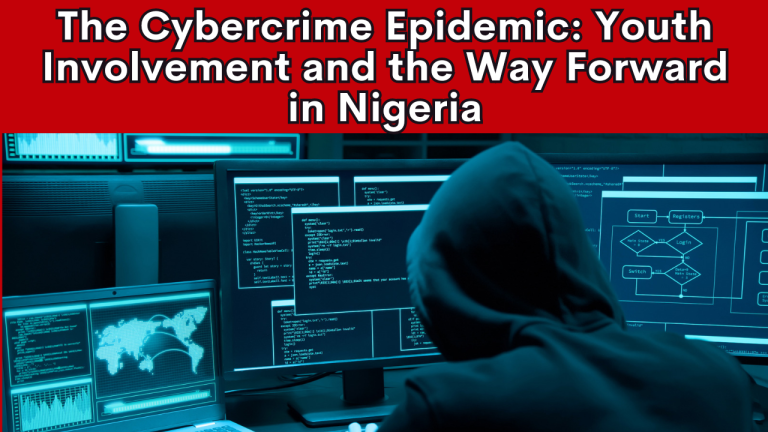By Heman Zakariya
Cyber or online-related activities have intensified within the last two decades. This involves education, investment, security, and crimes of various forms.
Cybercrime is the use of a computer as an instrument to further illegal ends, such as committing fraud, stealing identities, or violating privacy.
Cybercriminals can be individuals who are trading in illegal online content, scammers, or even drug dealers.
Some examples of cybercriminals: are: black-hat hackers, cyberstalkers, cyber terrorists and scammers
The constant development of gadgets, devices, and new technologies has both benefits and risks. The risk is the increase in cybercrime, which can be motivated by vulnerable devices, personal motivation, and financial motivation.
In Nigeria, the economic hardship has driven and is driving lots of youth into cybercrime. The most common cybercrimes globally are phishing and scam, identity theft, ransomware attacks, hacking / misusing computer networks, Internet fraud, etc.
Other forms of cybercrime are cyber bullying, cyber stalking, software piracy, social media frauds (most commonly practice in Nigeria and also known as yahoo yahoo), online drug trafficking, electronic money laundering, cyber extortion, intellectual-property infringements and online recruitment fraud.
According to Business Day, Nigeria recorded a 174% increase in cybercrimes within the first 6 months of 2022 and envisioned a 15% increase yearly. However, the happenings and dawning reality show that the incident in Nigeria has worsen beyond the proposed 15%.
In Nigeria, cybercrime is popularly known as yahoo yahoo and the most common include identification theft, fraudulent online transfers, payment-card frauds, network assaults, denial-of-service attacks by malicious networks of computers (botnets), ransomware, and malware attacks, amongst others.
In 2015, Nigerian government enacted and passed into law the Cybercrime Prohibition Act, which entered into force on 15th May 2015.
The purpose of the Act is also to promote cybersecurity and cybercrime prevention, and it provides for obligations to the private sector – including ISPs, telecommunication operators and financial institutions – to report and cooperate with law enforcement authorities and the Nigerian Computer Emergency Response Team (ng-CERT).
Nigeria is ranked first in Africa and third globally in cybercrime. The perpetrators, commonly known as “yahoo boys” or “gee boys,” target unsuspecting victims and refer to them as clients, maga, or mugu.
Recently, the term for cybercrime has changed to “bombing,” and defrauded foreign clients’ funds are referred to as repatriation funds.
Unfortunately, cybercrime in Nigeria has significantly increased among teenagers and young adults in secondary schools and tertiary institutions.
Initially, cybercrime was prevalent in cities like Lagos, Abuja, and Port Harcourt, but it has since spread to 10 additional cities, including Abuja, Ogun, Kaduna, Anambra, Enugu, Imo, Delta, Rivers, Edo, and Lagos states.
In recent years, cybercrime has further expanded to every city and town in Nigeria.
In higher institution of learning, yahoo boys are known as the big boys with ranks and levels in the practice, with newbies (armatures / novices) having mentorship for experts.
The manhunt and clampdown of Internet fraudsters or cybercriminals has been intensified by relevant security agencies like the Police, DSS and so on, but has not deter the continues influx of new cybercriminals in the country.
How to capitalize the use of cyber knowledge for economic growth
The number of youths engaged in Cybercrime AKA yahoo yahoo is alarming, it is practice by both computer and known computer literate (tech experts).
However, the Federal government can convert this youths from criminals to assets through the formation of state and local government Tech Hubs for training, nurturing and incubation of the youths and exposed talents, create business opportunities and create partnership with relevant multinational tech companies for engaging these talents.
To achieve this, a synergetic relation and partnership must be created between Nigerian Computer Emergency Response Team (ng-CERT), Federal ministry of Communication and Digital Economy, Nigerian Communication Commission, Federal ministry of External Affairs, Federal ministry of Justice, Federal ministry of Science and Technology, Federal ministry of Defense, Ministry of Interior and other relevant agencies.
Their responsibility should include sourcing, nurturing / incubating, creation of opportunities, international collaboration, provision of resources, monitoring, guiding and prosecution of defaulters who deviate and involve in illegal activities.
Gone are the days where arrest and manhunt of criminals are meant to serve as deterrent to others or prospective cybercriminals, the solution is to create an atmosphere where identified cybercriminals will be converted and transformed for legal cyber engagement under laws and policies that will regulate their activities.
Nigeria can be tagged a cyberspace for meaningful development and cyber security instead of cyber criminality and fraud.



